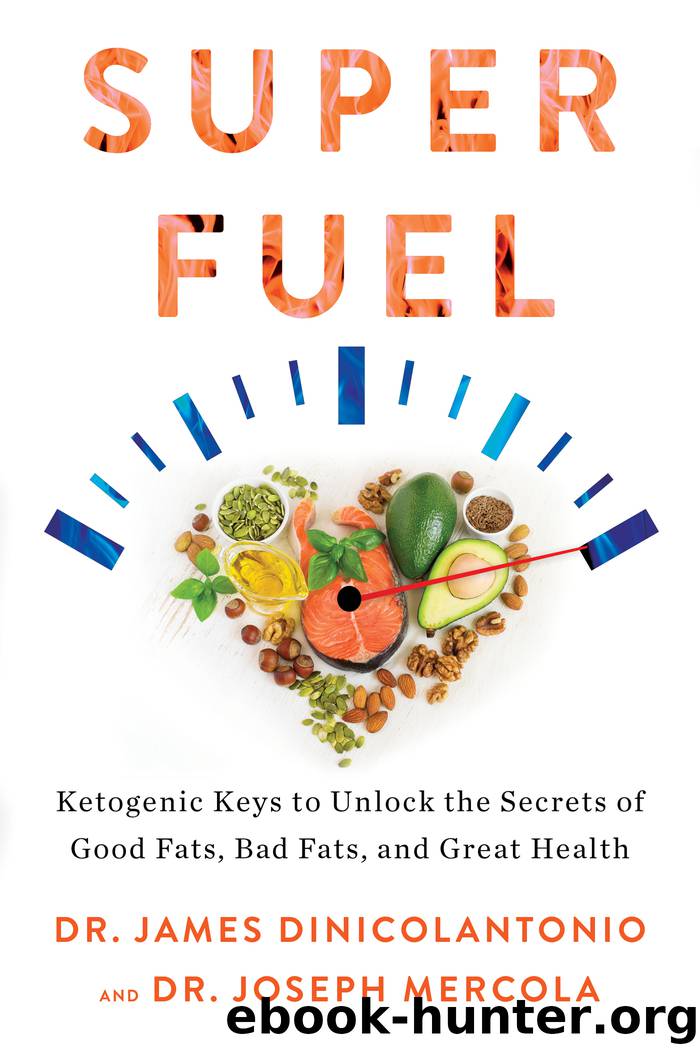Superfuel by Dr. James DiNicolantonio

Author:Dr. James DiNicolantonio
Language: eng
Format: epub
Publisher: Hay House
Published: 2018-09-19T16:00:00+00:00
ALZHEIMER’S AND INSULIN RESISTANCE
Insulin resistance is a major risk factor for cognitive decline. Some researchers have even called Alzheimer’s disease “insulin resistance of the brain” or “diabetes of the brain.”104 Alzheimer’s disease and other forms of cognitive decline are also associated with a reduction in your brain’s uptake and metabolism of glucose.105 Glucose typically serves as your brain’s primary fuel source, and PET scans show that Alzheimer’s patients have substantial reductions in brain-glucose uptake (up to 20 percent in some areas).106 What this means is that some forms of dementia may simply be a result of the brain “starving” for energy.
However, glucose isn’t the only fuel your brain can use. Ketones are another molecule your brain can use for energy. If you’re mindful of current understanding on health and nutrition, you’ve no doubt heard of ketogenic diets. (In fact, Dr. Mercola has written a best-selling book, Fat for Fuel, about how to optimize cyclical ketogenesis.) The intention of this approach is to improve mitochondrial function by helping your body regain the metabolic flexibility to burn fat as a primary fuel and allow your body to produce water-soluble fats called ketones.
Since ketones can serve as an important energy source for your brain, a number of studies have shown them to be useful for people with Alzheimer’s and other forms of cognitive impairment. The best fats to help your body generate ketones are medium-chain triglycerides and, even better, caprylic acid, which has only eight carbons and is relatively easily metabolized to ketones.
Insulin resistance, which plays such an important part in Alzheimer’s, impairs your body’s ability to produce ketones. Ketones are generally produced only when carbohydrate availability and insulin levels in your body are low. As a hormone, insulin has multiple functions, one of which is to signal your body that you’ve just eaten. If you consume a typical Western diet, with many carbohydrates, your insulin level typically rises after a meal, letting your body know there’s plenty of glucose (from carbs) to go around, so you don’t need to make ketones for energy.
If you have insulin resistance, your brain faces a double whammy in terms of starving for energy: glucose is not being used efficiently, and high insulin levels prevent appreciable generation of ketones, so your brain doesn’t get enough of either fuel. Insulin resistance undoubtedly leads to a reduction in the fuel supply available to your brain, and it’s a major risk factor for cognitive problems. But remember what you learned about insulin resistance in Chapter 4: it’s not solely about carbs. Your brain needs adequate DHA in order to be able to take up glucose properly. And since EPA increases fat burning, which could lead to higher ketone production, supplementation with both EPA and DHA may help to supply an aging, insulin-resistant brain with these nourishing ketones and potentially make it easier for your brain to use glucose as well.107
Postmortem studies have confirmed that Alzheimer’s patients, as well as those with cognitive impairment but not dementia, have reduced brain and blood DHA levels compared to healthy people.
Download
This site does not store any files on its server. We only index and link to content provided by other sites. Please contact the content providers to delete copyright contents if any and email us, we'll remove relevant links or contents immediately.
| Administration & Medicine Economics | Allied Health Professions |
| Basic Sciences | Dentistry |
| History | Medical Informatics |
| Medicine | Nursing |
| Pharmacology | Psychology |
| Research | Veterinary Medicine |
Periodization Training for Sports by Tudor Bompa(8247)
Why We Sleep: Unlocking the Power of Sleep and Dreams by Matthew Walker(6693)
Paper Towns by Green John(5174)
The Immortal Life of Henrietta Lacks by Rebecca Skloot(4571)
The Sports Rules Book by Human Kinetics(4377)
Dynamic Alignment Through Imagery by Eric Franklin(4205)
ACSM's Complete Guide to Fitness & Health by ACSM(4048)
Kaplan MCAT Organic Chemistry Review: Created for MCAT 2015 (Kaplan Test Prep) by Kaplan(3998)
Introduction to Kinesiology by Shirl J. Hoffman(3763)
Livewired by David Eagleman(3761)
The Death of the Heart by Elizabeth Bowen(3601)
The River of Consciousness by Oliver Sacks(3592)
Alchemy and Alchemists by C. J. S. Thompson(3509)
Bad Pharma by Ben Goldacre(3420)
Descartes' Error by Antonio Damasio(3270)
The Emperor of All Maladies: A Biography of Cancer by Siddhartha Mukherjee(3140)
The Gene: An Intimate History by Siddhartha Mukherjee(3091)
The Fate of Rome: Climate, Disease, and the End of an Empire (The Princeton History of the Ancient World) by Kyle Harper(3055)
Kaplan MCAT Behavioral Sciences Review: Created for MCAT 2015 (Kaplan Test Prep) by Kaplan(2979)
